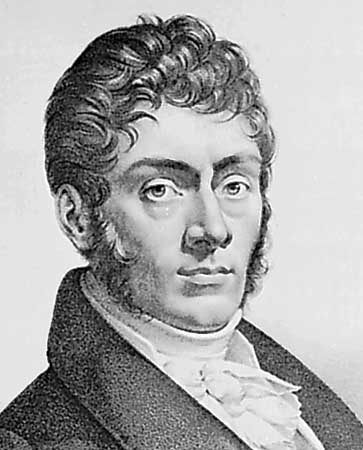Méhul, Étienne-Nicolas
French composer
born June 22, 1763, Givet, Ardennes, Fr.
died Oct. 18, 1817, Paris
 composer who influenced the development of French opera and who was one of the principal composers in the late 18th- and early 19th-century style.
composer who influenced the development of French opera and who was one of the principal composers in the late 18th- and early 19th-century style.In 1782 Méhul produced a cantata at the Concert Spirituel on a text by Jean-Jacques Rousseau. Influenced by Christoph Gluck and Luigi Cherubini, he turned to dramatic music and between 1787 and 1822 composed more than 40 operas, produced mainly at the Opéra-Comique. His first performed opera was Euphrosine et Coradin, ou le tyran corrigé (1790; Euphrosine and Coradin, or the Tyrant Corrected). His most successful works were Le Jeune Henri (1797), Les Deux Aveugles de Tolède (1806; The Two Blind Men of Toledo), Uthal (1806), and Joseph (1807). He also wrote patriotic works, demanding great choral and orchestral resources, to mark festive occasions of the French Revolution, such as the Hymne à la raison (1793).
Méhul had a bold sense of harmony and original gifts as a dramatist and orchestrator, although he was poorly served by his librettists. His operas emphasized the orchestra's role in opera; frequently he chose a theme that was developed symphonically as the dramatic action progressed. Besides writing operas he wrote piano sonatas, chamber works, and symphonic works. His influence on younger composers was considerable.
- Jorge Guillén
- Jorge Icaza
- Jorge Isaacs
- Jorge Luis Borges
- Jorge Manrique
- Jorgensen, Christine
- Jorge Rafaél Videla
- Jorge Rebelo
- Jorge Ubico (Castañeda)
- Jorhat
- Jorie Graham
- Joris, David
- Joris Ivens
- Joris-Karl Huysmans
- Jornal do Brasil, O
- Jorn, Asger
- Jos
- Josef Albers
- Josef Beran
- Josef Bohuslav Förster
- Josef Breuer
- Josef Casimir Hofmann
- Josef Dietrich
- Josef Dobrovský
- Joseffy, Rafael